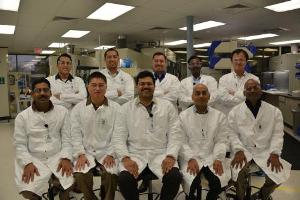Dec 13 2013
Life Technologies Corporation announced today that the company's Austin manufacturing facility has received the 2013 Presidential Green Chemistry Challenge Award in the category of Greener Synthetic Pathways. Life Technologies' Austin, Texas, facility was recognized for its "Safe, Sustainable Chemistries for the Manufacturing of PCR Reagents" Program.
The award was presented today at a ceremony at the Environmental Protection Agency (EPA) in Washington, D.C. Since its inception, there have been less than 90 recipients chosen from nearly 1,500 nominations for the annual award.
 Life Technologies research team awarded 2013 Presidential Green Chemistry Challenge Award. Starting from Left row (sitting): Dr. Srinivasan Balasubramanian, Dr. Xiao Zejun, Dr. Kore Anilkumar, Dr. Halasyam Mohan, and Dr. Charles Irudaya. Left row (standing): Mr. Padilla Matthew, Mr. Navarro Alex, Dr. Garcia Israel, Dr. Muthian Shanmugasundaram, and Dr. Yang Bo. (PRNewsFoto/Life Technologies Corporation)
Life Technologies research team awarded 2013 Presidential Green Chemistry Challenge Award. Starting from Left row (sitting): Dr. Srinivasan Balasubramanian, Dr. Xiao Zejun, Dr. Kore Anilkumar, Dr. Halasyam Mohan, and Dr. Charles Irudaya. Left row (standing): Mr. Padilla Matthew, Mr. Navarro Alex, Dr. Garcia Israel, Dr. Muthian Shanmugasundaram, and Dr. Yang Bo. (PRNewsFoto/Life Technologies Corporation)
The Presidential Green Chemistry Challenge Awards Program recognizes individuals and organizations for successful research, development, and implementation of innovative technologies to reduce waste and promote safer chemistries. This nationwide challenge, launched in 1995 in partnership with the U.S. Environmental Protection Agency, American Chemistry Society and other members of the chemical community, is open to universities and industry.
The Austin team's innovative work involves novel methods for developing Deoxyribonucleotide triphosphates (dNTPs) - the individual building blocks for DNA that are made during Polymerase Chain Reaction (PCR), a process to amplify specific cloned or genomic DNA during genetic sequencing. Conventional syntheses of dNTPs are inefficient, involve multiple steps that require isolation and purification of intermediates, and use excessive volumes of toxic or hazardous solvents and reagents.
"Our research team in Austin saw an opportunity to improve sustainability within the day-to-day processes utilized by teams in our facility," said Anil Kore, Senior Manager, Manufacturing. "The team's innovative efforts helped to virtually eliminate the need for transferring reaction material and utilizing hazardous reagents and solvents. By using these new dNTP routes, worker exposure to hazardous material is minimized and waste production is significantly reduced – improving safety and our impact on the environment."
In 2011, Life Technologies implemented the new, greener synthetic routes for the production of dNTPs and their analogues at the Austin manufacturing site. Since then, organic solvent consumption has been reduced by up to 95 percent and other hazardous waste up to 65 percent compared to conventional protocols. By improving the yields and specificity of reaction, the ratio of mass of waste to mass of product has been reduced from approximately 3,200 to 400, leading to the elimination of hundreds of tons of hazardous waste per year.
"Life Technologies is committed to ensuring its overall business is grounded in efforts to reduce its impact and footprint on the environment and improve overall sustainability, both globally and in the regions and areas where we live and work," said Cristina Amorim, Chief Sustainability Officer at Life Technologies. "This award underscores that commitment, and showcases the tremendous talents and efforts by our teams to ensure we are balancing scientific innovation with the need to be good stewards of the environment."
In 2012, Life Technologies' sustainability efforts delivered $5 million in productivity. From 2008 through 2012, Life Technologies cut energy use by 22 percent, water use by 52 percent, and CO2 emissions by 21 percent.